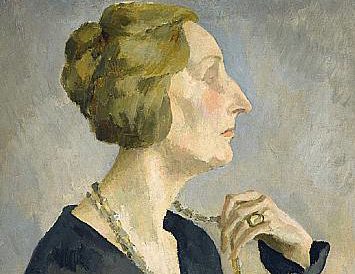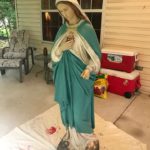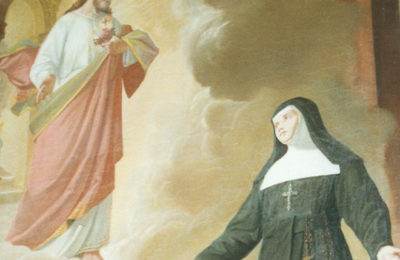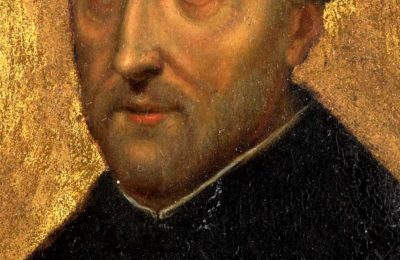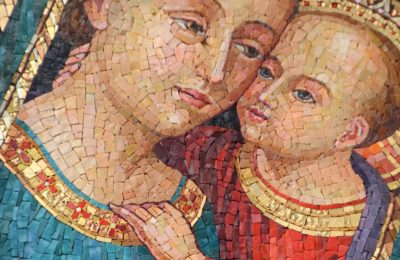“My poems are hymns of praise to the glory of life.” Dame Edith Sitwell
The English poet Dame Edith Sitwell (b. 1887- d. 1964) might be categorized as “eccentric” if the negative connotations associated with the word might be removed, for in our world, where everyone seems determined to follow the crowd (of course, a normal human tendency, as the sheep of the Gospel point out), this grand lady stood out like a flower in the desert.
Though an English aristocrat by birth and upbringing, and subject to the privileges associated with this class in English society, Dame Edith did not have an idyllic childhood: she suffered from parental emotional neglect. In adulthood, she stated that she simply did not know her parents for she saw little of them in her childhood; and, what little she did see, was marred by her father’s dislike of her physical appearance, and her mother’s plaguing immaturity, expressed in fits and rages, and a need to live a partying lifestyle well into her later years. This passive and active neglect, however (as difficult things often do when given into the hands of God), did make her the artist she came to be for it afforded her long hours alone, where she developed her imaginative sense, independent personality, humor, and love of beauty and art. Subsequently, Dame Edith spent her life devoted to the arts, not only developing her own poetry, but promoting and encouraging artists, who she took under her wings. Her poetry is filled with a spark of life, and reflects her love of beauty, nature, and the Divine. She said,
“As for the usefulness of poetry, its uses are many. It is the deification of reality. It should make our days holy to us. The poet should speak to all men, for a moment, of that other life of theirs that they have smothered and forgotten.”
In August of 1955, at the age of sixty-seven, Dame Edith entered the Roman Catholic Church. The writer, Evelyn Waugh, was her godfather; while her friend, the English actor, Alec Guinness, wrote upon the occasion: “Her tall figure, swathed in black, looking like some strange eccentric bird… she seemed like an ageing princess come home from exile.” Dame Edith commented at the time that,
“I have taken this step because I want the discipline, the fire and the authority of the Church. I am hopelessly unworthy of it, but I hope to become worthy.” (source)
Speaking of fire, my favorite line of Dame Edith’s poetry is this, she is describing herself in it:
“The great sins and fires break out of me like the terrible leaves from the bough in the violent spring. I am a walking fire, I am all leaves.” (1952, from Selected Poems)
“I am a walking fire, I am all leaves.”
Beautiful.
Apparently these lines must have hit a chord with others, as well, for Dame Edith was asked their meaning in a 1959 television interview, and thankfully, we can view her response here (see her response at the 40 second mark):
The entire interview may be viewed in the following link, and it is quite fascinating, for it shows the spark of her personality, her wit, and her thoughtful poetical heart:
Much commentary is taken up with Dame Edith’s physical appearance and attire. She said about this subject:
“Why not be oneself? That is the whole secret of a successful appearance. If one is a greyhound, why try to look like a Pekingese?”
And:
“The trouble with most Englishwomen is that they will dress as if they had been a mouse in a previous incarnation… they do not want to attract attention.”
Dame Edith did not dress like a mouse. No, she stood out wherever she went, capped with hats, large jewels, flowing caftans, and her own self -assurance.
Dame Edith’s most famous poem, written during the bombing of London during World War II, is Still Falls the Rain. The poignancy of this difficult moment in British history can still be felt when reading this work:
Still falls the Rain—
Dark as the world of man, black as our loss—
Blind as the nineteen hundred and forty nails
Upon the Cross.Still falls the Rain
With a sound like the pulse of the heart that is changed to the hammer-beat
In the Potter’s Field, and the sound of the impious feetOn the Tomb:
Still falls the RainIn the Field of Blood where the small hopes breed and the human brain
Nurtures its greed, that worm with the brow of Cain.Still falls the Rain
At the feet of the Starved Man hung upon the Cross.
Christ that each day, each night, nails there, have mercy on us—
On Dives and on Lazarus:
Under the Rain the sore and the gold are as one.Still falls the Rain—
Still falls the Blood from the Starved Man’s wounded Side:
He bears in His Heart all wounds,—those of the light that died,
The last faint spark
In the self-murdered heart, the wounds of the sad uncomprehending dark,
The wounds of the baited bear—
The blind and weeping bear whom the keepers beat
On his helpless flesh… the tears of the hunted hare.Still falls the Rain—
Then— O Ile leape up to my God: who pulles me doune—
See, see where Christ’s blood streames in the firmament:
It flows from the Brow we nailed upon the treeDeep to the dying, to the thirsting heart
That holds the fires of the world,—dark-smirched with pain
As Caesar’s laurel crown.Then sounds the voice of One who like the heart of man
Was once a child who among beasts has lain—
“Still do I love, still shed my innocent light, my Blood, for thee.”
A recording of Dame Edith reading Still Falls the Rain may be found here.
How lovely it would have been to have met her, that walking fire, a woman perpetually reborn, perpetually re-leafed.
•SCF
Image: source

